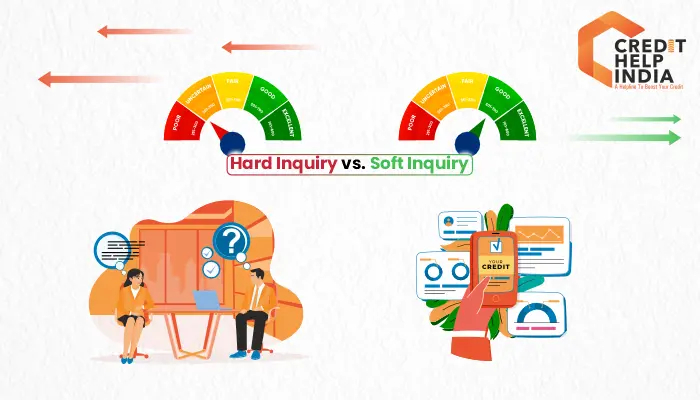Hard Inquiry vs. Soft Inquiry: What's the Difference?

Introduction
When you apply for a loan or credit card, lenders often run a credit check. But not all credit checks are the same. The difference between hard inquiries and soft inquiries is that hard inquiries can temporarily lower your credit score, while soft inquiries have no effect.
Understanding these two types of checks is important if you want to manage your credit health effectively.
In this blog, we’ll explain what each means, when they happen, and how they impact your credit report!
Key takeaways-
Hard inquiries from loan or credit applications can lower your score, while soft checks for pre-approvals or personal monitoring have no effect.
Minimise score damage by rate-shopping; multiple hard inquiries for the same loan type within 14-45 days are often counted as one.
Only unauthorised hard inquiries can be disputed; legitimate ones remain on your report for 24 months, but their impact fades.
Use soft inquiries to monitor your credit health frequently without any risk to your score.
A strong credit score reduces reliance on new applications, preventing unnecessary hard inquiries and rejections.
What is a Credit Inquiry?
A credit inquiry occurs when someone requests to view your credit report or credit score.
Think of it as a formal request to get into your financial history and current credit standing.
Whether you're applying for a credit card, checking your free credit score, or when a lender or financial institution runs a background check before giving you a loan, these all constitute different types of credit inquiries.
Did you know? Every time your credit is checked, it leaves an impact on your credit report. However, not all inquiries are created equal; some can impact your credit score, whilst others are completely harmless to your credit health.
There are two types of credit inquiries – hard inquiries vs soft inquiries, and understanding the difference is important because each affects your credit score differently.
Tip: Before applying for any form of credit, always ask the lender whether they'll perform a hard or soft inquiry. This simple question can help you avoid unexpected drops in your credit score.
What is a Hard Credit Inquiry?
A hard credit inquiry (sometimes called a hard pull) happens when a lender or financial institution checks your credit report to make a lending decision.
Typical scenarios include:
- Applying for a credit card
- Applying for a mortgage or car loan
- Requesting a personal loan
- Certain types of rental applications
Because lenders use this information to assess your risk as a borrower, a hard inquiry may slightly reduce your credit score. Too many hard inquiries within a short period can signal risk to lenders.
Tip: If you’re comparing loan offers from different lenders, try to keep all applications within a 14–45-day window. Credit scoring models often treat these as a single inquiry, minimising the impact.
How Long Do Hard Inquiries Stay on Your Credit Report?
Hard inquiries remain visible on your credit report for 24 months (2 years) from the date they were made. However, their impact on your credit score decreases significantly over time.
Regularly check your free credit score on Credit Help India to monitor how inquiries are affecting your credit health.
Can I remove hard inquiries from my credit report early?
You can only dispute hard inquiries that were made without your permission or due to identity theft.
Legitimate hard inquiries that you authorised cannot be removed before the 24-month period expires.
Important Reminder: If too many hard inquiries are hurting your credit score, Credit Help India can help restore your credit health and guide you towards better credit management practices. Our expert team understands the fundamentals of credit inquiries and can develop a personalised strategy to improve your credit standing.
What is a Soft Credit Inquiry?
A soft credit inquiry (also called a "soft pull" or "soft credit check") occurs when your credit is checked for purposes other than a credit application.
These inquiries don't require your direct permission and have zero impact on your credit score.
Common Types of Soft Inquiries:
Personal Credit Monitoring: When you check your free credit score, this generates a soft inquiry that won't harm your credit.
Pre-approval Checks by Credit Card Issuers: Credit card companies often perform soft pulls to determine whether you qualify for their promotional offers before sending you mail.
Employment Screening: Potential employers may run soft inquiries as part of background checks, particularly for positions involving financial responsibilities.
Did you know? Soft inquiries may not even appear on credit reports viewed by lenders. When they do appear, they're only visible to you and don't factor into credit scoring calculations.
How Long Do Hard Inquiries Stay on Your Credit Report?
Hard inquiries remain on your credit report forever , they have impact on your credit score in terms of lowering of Credit Score.
Examples of Hard Credit Inquiries and Soft Credit Inquiries
Understanding the difference between hard and soft inquiry becomes clearer with real-life examples.
Hard Credit Inquiries (may affect your score):
- Applying for a new credit card
- Applying for a personal loan or home loan
- Auto loan or car finance application
- Requesting a mortgage refinance
- Rental applications
Soft Credit Inquiries (no impact on score):
- Checking your own credit report
- Pre-approved credit card offers
- Background checks by employers
- Insurance companies verify your history
Key Differences: Hard Inquiry vs. Soft Inquiry
The difference between hard and soft inquiry comes down to impact, purpose, and visibility.
Think of a hard inquiry as a formal credit check for lending decisions, while a soft inquiry is more of a background check with no consequences.
| Aspect | Hard Inquiry | Soft Inquiry |
|---|---|---|
| Purpose | Lenders assess your eligibility for new credit | General checks for information or background |
| Impact on credit score | May lower your score by a few points | No effect on credit score |
| Who can see it | Both you and future lenders | Only you can see it |
| Frequency limits | Should be limited to avoid damage | Unlimited without any consequences |
| Effect on loan approval | Multiple inquiries may raise concerns | No effect on lending decisions |
| Examples | Applying for a loan, credit card, or mortgage | Checking your own credit, pre-approvals, and employer checks |
Do Credit Inquiries Affect Credit Score?
Yes, but it depends on the type,
Hard inquiries: Can reduce your score by a few points, especially if you have many within a short time.
Soft inquiries: Do not affect your credit score in any way.
If multiple hard inquiries have lowered your score, explore our credit score improvement services to build your credit score and strengthen your credit profile.
How to Minimise Credit Inquiries?
You can’t always avoid inquiries, but you can manage them wisely.
1. Apply only when necessary
Don’t apply for multiple loans or credit cards casually.
2. Use soft inquiries for monitoring.
Regularly check free credit scores to stay updated without hurting your score.
3. Plan ahead
If you know you’ll apply for a loan, avoid other applications for a few months.
4. Work on CIBIL score
A strong credit profile reduces the need for repeated checks. Learn how CIBIL scores affect the loan approval process and prepare before applying.
Advice: Many people don’t realise that too many credit card rejections create repeated hard inquiries. Instead of applying everywhere, check your eligibility first. This simple step can save your credit score from unnecessary damage.
FAQ’s
1. What is the difference between a hard inquiry and a soft inquiry?
A hard inquiry may lower your credit score, while a soft inquiry does not. Hard checks occur during credit applications; soft checks are background reviews or self-checks.
2. When are hard inquiries commonly made?
Hard inquiries happen when you apply for credit cards, loans, mortgages, or car financing. They signal active credit-seeking and can temporarily lower your score.
3. How many hard inquiries is too many?
More than 5–6 hard inquiries in a year may raise concerns for lenders. Multiple inquiries within a short time can indicate a higher borrowing risk.
4. Will checking my own credit scores result in a hard inquiry?
No. Checking your own credit score creates a soft inquiry, which does not affect your score and is only visible to you.
5. What is a credit inquiry, and why is it done?
A credit inquiry records when your report is accessed. Lenders use it to assess creditworthiness; employers or landlords may use it for background checks.
6. How can I differentiate between soft and hard credit checks?
Hard checks are for credit applications and may affect your score. Soft checks are for background or self-reviews and have no score impact.
7. Can I remove hard inquiries from my credit report?
Valid hard inquiries can’t be removed but fade after 12-24 months. Unauthorised or incorrect inquiries can be disputed with the credit bureau.
Conclusion
The difference between hard and soft inquiries is simple: hard checks may lower your credit score, while soft checks never do. Hard inquiries matter to lenders; soft ones don’t. By applying wisely and tracking your credit report, you can protect your credit health.
Need help improving your credit score? Trust Credit Help India’s Credit Score Improvement Services to guide you towards stronger credit. Contact us today!


